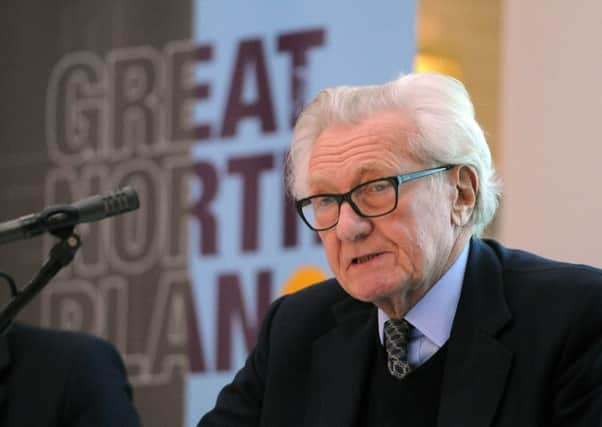Heseltine tells Yorkshire to be at heart of '˜devolution revolution'


Former deputy prime minister Lord Heseltine argued the Government’s offer of greater local powers in return for areas agreeing to have elected mayors was a “once in a lifetime opportunity” Yorkshire should embrace.
But he ruled out the Government imposing a solution to the ongoing dispute over how Yorkshire should take on devolved powers.
Advertisement
Hide AdAdvertisement
Hide AdSpeaking in Leeds, Lord Heseltine contrasted Yorkshire’s position with the agreements Chancellor George Osborne has struck with other areas to hand over powers in areas such as transport and skills.
He said that “virtually the whole of the North of England and West Midlands” would now be run by devolved authorities led by mayors elected next year.
Lord Heseltine said: “If I inject a personal view I very much hope that local leaders will look to the opportunities on offer, put traditional and parochial loyalties on one side and take their rightful place at the heart of the revolution of devolved power now engaging our country.”
Creating a series of regional authorities led by elected mayors is one of the key pieces of Mr Osborne’s “northern powerhouse” vision for economic growth in the North of England.
Advertisement
Hide AdAdvertisement
Hide AdMr Osborne and other ministers have repeatedly stressed they will not force Yorkshire authorities to reach agreement or impose a deal from London.
But with North, West and East Yorkshire representing the last piece of the jigsaw and Mr Osborne’s latest Budget just weeks away, expectations were growing that the Government might move to break the deadlock.
Speaking at an event organised by the IPPR North thinktank, Lord Heseltine ruled out such a move.
“The Government’s position is clear. They are not going to impose a solution. All of us recognise and understand the human and historic tensions involved in finding common ground between neighbouring or different types of local authority.
Advertisement
Hide AdAdvertisement
Hide Ad“It would be just the same in the private sector or on Whitehall itself. Imposing an inevitably controversial solution can lead to a simmering mood of discontent.
“The Government is concerned to avoid such a background as the backdrop to its determination to share power more widely,” he said.
South Yorkshire councils working with Nottinghamshire and Derbyshire neighbours have agreed an outline devolution deal that will see a mayor for the area elected next year.
But the Government has been presented with a range of plans for the rest of the region with councils in the North, West and East unable to agree on how the area should be divided up to take on the powers on offer.
Advertisement
Hide AdAdvertisement
Hide AdLord Heseltine spearheaded the regeneration effort of the Conservative govermment of the 1980s in the North and advised the Coalition on devolution.
Now an adviser to Local Government Secretary Greg Clark, Lord Heseltine is also a member of the National Infrastructure Commission which is currently considering the priorities for transport investment in the North.
He told IPPR North’s Northern Summit the new elected mayors would have “enormous power in political terms” with the posts attracting high calibre candidates.
“I believe this to be a once in a lifetime opportunity. The Government has set in train the most full scale and radical devolution plans I have witnessed throughout my career,” he said.
Advertisement
Hide AdAdvertisement
Hide AdIPPR North director Ed Cox used the event to call for the devolution deals being struck to take in a broader range of views.
He said: “The northern powerhouse agenda has been galvanised by a series of ‘devolution deals’ between government and the big cities but many in the North feel they have been brokered with very little consultation or engagement with business or the wider general public.”
Mr Cox also questioned the major focus on improving transport connections and said energy, water and rural policy were among other areas that could benefit from a pan-northern approach.